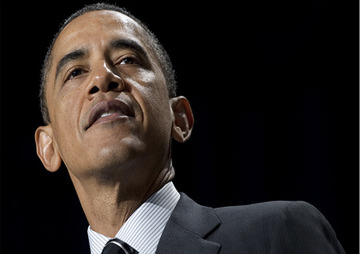Obama to Sign Executive Order to Raise Minimum Wage to $10.10 for Workers Under Federal Contractors
porchlife (CC BY-NC-SA 2.0) The nation awaits Barack Obama’s State of the Union address Tuesday, when he is meant to discuss income inequality, but the president has already made a powerful statement. He will no longer let Congress (namely Republicans in Congress) keep him from passing laws that will improve Americans’ quality of life. Raising […] porchlife (CC BY-NC-SA 2.0)
porchlife (CC BY-NC-SA 2.0)
The nation awaits Barack Obama’s State of the Union address Tuesday, when he is meant to discuss income inequality, but the president has already made a powerful statement. He will no longer let Congress (namely Republicans in Congress) keep him from passing laws that will improve Americans’ quality of life. Raising the minimum wage, even if the order applies only to people working for federal contractors with a new or renegotiated agreement, is definitely a great place for Obama to start.
The New York Times:
After a year in which most of his legislative priorities went nowhere, Mr. Obama is seeking ways to make progress despite a lack of cooperation on Capitol Hill.
The minimum wage plan provides an example of what he has in mind. Mr. Obama called on Congress during last year’s State of the Union address to raise the minimum wage for workers across the board, only to watch the proposal languish on Capitol Hill, where opponents argued it would hurt businesses and stifle job creation. With prospects for congressional action still slim, Mr. Obama is using the executive order covering federal contractors to go as far as he can on his own.
“You can be sure that the president fully intends to use his executive authority to use the unique powers of the office to make progress on economic opportunity, to make progress in the areas that he believes are so important to further economic growth and further job creation,” Jay Carney, the White House press secretary, told reporters on Monday.
But the minimum wage order will also illustrate the limits of that approach. If Congress increases the federal minimum wage to $10.10 from $7.25 as Mr. Obama has sought, 21 million employees will eventually get a raise unless their jobs are eliminated, according to estimates by a liberal research organization. Mr. Obama’s order will affect relatively few at first because it will apply only to new or renewed contracts, and even down the road at most it might affect several hundred thousand workers.
Even so, Mr. Obama’s vow to use his executive authority more robustly has drawn criticism from Republicans who say he has already stretched and, in some cases, exceeded the bounds of his power, much as he once accused President George W. Bush of doing.
Among other things, Mr. Obama unilaterally deferred deportation of many younger illegal immigrants after Congress declined to pass legislation giving them legal status. He has delayed enforcement of several aspects of his hotly disputed health care law. He declined to defend in court the Defense of Marriage Act, a law barring federal recognition of same-sex marriages.
As he looks ahead to three more years in office, and with Republicans likely to still hold one if not both houses of Congress, Mr. Obama has sought other ways of enacting his agenda. Perhaps the most far-reaching area will be the environment, where the Environmental Protection Agency is working on regulations to limit carbon emissions at the nation’s power plants.
Republicans dismissed the notion that Mr. Obama should give up on Congress and rely on his own power more. “Ronald Reagan didn’t think that, and Bill Clinton didn’t think that,” Senator Mitch McConnell of Kentucky, the Republican leader, said on “Fox News Sunday” over the weekend. “Frequently, times of divided government are quite good times in terms of achieving things for the American people.”
—Posted by Natasha Hakimi
Your support matters…Independent journalism is under threat and overshadowed by heavily funded mainstream media.
You can help level the playing field. Become a member.
Your tax-deductible contribution keeps us digging beneath the headlines to give you thought-provoking, investigative reporting and analysis that unearths what's really happening- without compromise.
Give today to support our courageous, independent journalists.






You need to be a supporter to comment.
There are currently no responses to this article.
Be the first to respond.